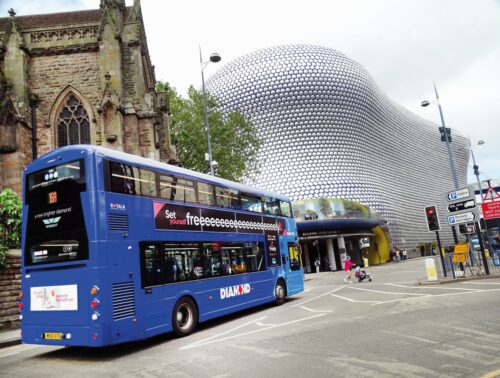
The Midlands-based company says that a route-by-route method offers a safer and more inclusive road to franchised operation than Manchester-style ‘tranches’
Speaking about the current trend towards franchised operation in large urban areas, Rotala says that a route-by-route franchising model is the best option. Rotala CEO Simon Dunn says that the company supports the principle of franchising to reform the bus market in the West Midlands, but has followed the lead of Scottish independent McGill’s in raising what he says are ‘serious concerns’ about the proposed tranche-style franchising model as used in Manchester.
Rotala says it has submitted a full consultation response to Transport for the West Midlands, along with supporting evidence from Oxera Consulting LLP, and that it has shared a summary of its submission in order to raise awareness of the issues it believes are a concern. Drawing on its practical experience in both the West Midlands and the Bee Network in Greater Manchester via its Diamond Bus subsidiaries, Rotala argues that a route-by-route approach modelled on the long-established London system is better suited to address the region’s transport challenges. Its key arguments in favour of a route-by-route franchising model are:
1. A lower cost and lower risk:
A tranche-style model as used by Transport for Greater Manchester in creating its Bee Network requires significant capital outlay particularly for depot and vehicle acquisition and exposes West Midlands Combined Authority (WMCA)
to considerable operational and financial risks. In contrast, Rotala says that a route-by-route model allows operators to retain ownership of depots and vehicles, reducing upfront costs and long-term liabilities to the authority and, by extension, the taxpayer.
2. Greater competition and market access:
By allowing operators to bid for individual routes, a route-by-route approach encourages wider participation, the company believes, especially from small and medium-sized operators (SMOs), in contrast to tranche models which tend to favour larger operators due to the scale and complexity of the contracts. One major barrier for SMOs under the tranche approach is the significant cost of bidding, Rotala adds, with some operators spending hundreds of thousands of pounds just to compete, often with no guarantee of securing any work, a level of financial risk which is often prohibitive for smaller businesses. Under a route-by-route system, operators can target bids that match their capacity and resources, increasing their chances of success and preserving diversity and competitiveness in the market.
3. Improved operational flexibility and stability:
Maganing performance issues or service disruptions is far simpler at route level, the company believes, whilst under a route model, failing operators can be replaced without retendering entire areas, which enhances service reliability and network stability, even amidst political or economic changes.
4. Better outcomes for employees and investment:
Rotala says that tranche-based contracts create employment instability due to the TUPE process and discourage operator investment in training and staff retention, whereas a route-based model, by allowing continuity of service and employment, supports long-term workforce development and mitigates driver shortages.
5. Enhanced passenger experience:
Rotala says that its experience in Manchester has shown it that centralised control under the tranche model has not translated into improved punctuality or customer service, and that a decentralised, route-level approach supports a more responsive, accountable service aligned with local passenger needs.
6. Faster, more manageable implementation:
The company finds that route-by-route franchising avoids the delays and complexity of acquiring infrastructure and enables a more staggered, agile roll-out of services, in turn lowering implementation risk and facilitating smoother transitions.
7. Encourages long-term operator investment:
With more frequent and manageable bidding cycles, the company believes route-based contracts provide a clearer business case for long-term investment by operators, including in depots, fleets and staff, helping to build a stronger, more resilient network.

